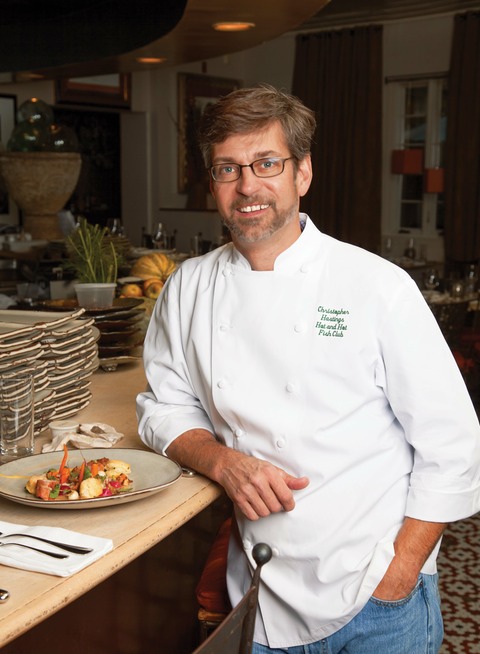By Pierce Lydon
Chef Chris Hastings started his culinary journey the way that many do; he went to culinary school. He studied at Johnson & Wales in Providence, Rhode Island before moving to Birmingham, Alabama to work as the Chef de Cuisine at Frank Stitt’s Highlands Bar and Grill. In 1989, his thirst for knowledge led him to the Bay Area to work under Bradley Ogden to open the Lark Creek Inn. He eventually came back to Birmingham, opening the Hot and Hot Fish Club with his wife Idie in 1995. Since then, they have both been featured in national publications such as The New York Times and USA Today. In 2012, Chris won the James Beard Foundation’s “Best Chef: South” award.
We asked Chef Hastings about the importance of the Bocuse d’Or and the keys to becoming a great chef.
Bocuse d’Or USA: Why are you a part of the Bocuse d’Or USA?
Chris Hastings: I feel strongly that it is high time for the “American Chef” and “American Cuisine” to bring its freedom to dream, its bold flavors and its distinctive thinking to the international stage. Also, it is absolutely time we, as an “American Food Culture”, stop looking inward during our discovery of exactly who we are and begin looking outward into the world so we can lead. We are Americans after all! We like to compete, to lead and, more importantly, we like to win!
Bocuse d’Or USA: Why is the Bocuse d’Or competition important in the grander culinary world?
Chris Hastings: Those involved in anything worth doing, whether it be art, music, design, literature or architecture, have always found ways to celebrate, preserve and recognize their “best in class”. Bocuse d’ Or is and has been the one international celebration of food that accomplishes all of these things. Therefore, the Bocuse d’Or competition is very important to our craft and to the art of cooking worldwide.
Bocuse d’Or USA: What does “American Cuisine” mean to you?
Chris Hastings: It means the freedom to dream and to be bold in your thinking and cooking without any restrictions or fear of breaking traditions that other cultures are faced with. It can be a recipe for a mess but it assures the American chef the best possible environment to be true to his/her vision (if you have real chops in the kitchen).
Bocuse d’Or USA: What makes a great chef?
Chris Hastings: Every accomplished chef could write a book on the many lessons learned along the way as well as the journey itself and the value of the journey towards becoming a great chef. With that said, there are very specific things I believe all accomplished chefs share in common.
- Not just a great palate, but great senses. Meaning, as a chef, every sense you have should tell you something you need to know about your cooks and your process when you walk into the kitchen. Your eyes tell you that the PM chef forgot to leave a note to pull the stock at 8 AM because it still simmers at 10 AM. Your skin tells you the cooler is not at the correct temperature and needs immediate attention. Your nose tells you that it is time to check the bread and rotate it. Your ears tell you the young line cook did not bring the sautée pan to a high enough temperature because its sizzle doesn’t sound right. It catches your ears before you lay eyes on it. Your palate confirms or calls into question your training and the oversight of your process and your team.
- An unquenchable thirst for knowledge in all things in and outside of cooking.
- An ability to lead, effectively taking a team towards the goal and sustain the standards at all times.
- A tremendous work ethic. Great chefs are forged between the hammer and anvil of hard work in amazing kitchens. There are no shortcuts!
- The vision and the focus to see the minutia of your dream is tended to even at its most mundane and repetitive moments. Essentially, an unrelenting attention to detail.
- A clean organized kitchen that optimizes efficiency; no matter its size.
Bocuse d’Or USA: What inspired you to start cooking?
Chris Hastings: First of all, my mother was a tremendous cook. I spent many hours preparing family meals in the kitchen with her and was inspired by the lifelong bonds that were formed with my family at the dinner table. Second, shortly after my mother’s death, I started my first restaurant job at the age of 17. I was taken in and treated as family by the owners and Chef John Daily. They encouraged and developed my interest in considering food as a profession during that period which led me to culinary school instead of pursuing my acceptance at Appalachian State.
Bocuse d’Or USA: Who is your greatest culinary inspiration? Why?
Chris Hastings: Bradley Ogden opened my eyes to the hope, possibilities and uniqueness of a distinctly American chef. His love for and commitment to the best seasonally available ingredients were his trademarks. He was also a genius at creating dishes that had that distinct “This is how an American chef thinks and creates big, intense flavors that are delicious”. That experience with Bradley set me on a path to create my uniquely American and distinctly Southern voice as a chef.
You must improve your process and evolve. You need to be equal parts businessmen, chef and restaurateur; each very different and necessary.
– Chris Hastings
Bocuse d’Or USA: When did you open your first restaurant?
Chris Hastings:Eighteen years ago in 1995 in Birmingham, Alabama.
Bocuse d’Or USA: How did you develop your personal cooking style?
Chris Hastings: By blending my life experiences (growing up in the South, traveling, reading, eating everything everywhere I could) and my work in great kitchens. These two combined to put a fine point on my thinking. Continuously evolving my thinking has been critical as well.
Bocuse d’Or USA: How has your personal cooking style changed over the years?
Chris Hastings: I started out with a more casual approach to the way I cooked and presented our food. That is not to say it wasn’t delicious or serious in its approach; just less formal. Too often for me, formal had equaled pretense in cooking, so I avoided it. Now we are very focused on precision and modern cooking techniques blended with traditional methods like fermentation, meat curing, smoking, etc. This allow us to ride a great creative edge that pulls from both worlds. More formal “thinking” that creates amazing food without the pretense. I am too old for pretense in my life.
Bocuse d’Or USA: What advice do you have for young chefs and restaurateurs who are just getting started?
Chris Hastings: Well, I guess this is the official interview where I renounce youth- had to happen eventually. Seriously though, it boils down to an unrelenting commitment to your vision and your ability to endure the “hammer and anvil” that is this business. That along with smart, well thought out decision making everyday. You must improve your process and evolve. You need to be equal parts businessmen, chef and restaurateur; each very different and necessary.
Thank you to Chef Hastings for taking the time to answer our questions. To learn more about him, check out hotandhotfishclub.com/the-restaurant/about-us.











